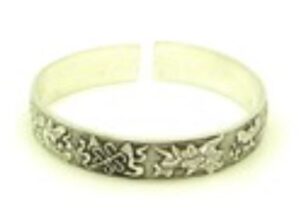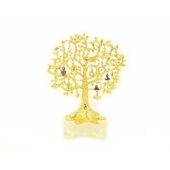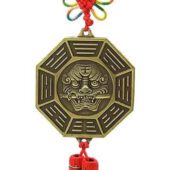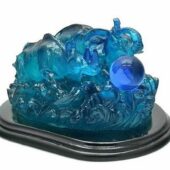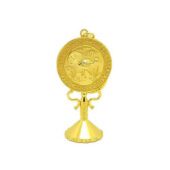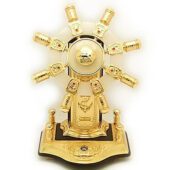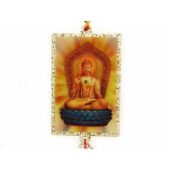Description
An exotic Tibetan-style silver bangle embossed with the eight auspicious Buddhist symbols. Wear it for all-around good luck and blessings.
The Eight Auspicious Symbols are a group of lucky Buddhist symbols that appear on many Buddhist textiles, objects, and paintings. Each symbol represents an aspect of Buddhist teaching and when they appear together, their powers are said to multiply.
The eight Buddhist auspicious symbols consist of a parasol, pair of golden fish, the great treasure vase, a lotus, the right-turning conch, the endless knot, the banner of victory, and the wheel of dharma.
These symbols derived from Indian iconography have become especially popular in Tibetan Buddhism. Here are what each of these symbols means and represents.
Parasol (Chattra) – royalty and spiritual power and protection from suffering, desire, obstacles, and illness. The parasol dome can symbolize wisdom and the hanging skirt, compassion.
Golden Fishes (Suvarnamatsya) – happiness, freedom, abundance, good fortune, fertility, and salvation.
Treasure Vase (Kalasha) – spiritual and material abundance. The ‘inexhaustible treasures’ possess special qualities so that however much is removed from the vase, it will always remain full. Therefore it symbolizes long life and prosperity.
Lotus (Padma) – mental and spiritual purity. It is able to grow and blossom from the muddy water.
Conch Shell (sankha) – It is a symbol of power and sovereignty, the sound believed to banish evil spirits, scare away harmful creatures and avert natural disasters. Buddhism adopted it as a symbol of religious sovereignty and an emblem that spreads the truth of dharma.
Endless Knot (Shrivasta) – The endless knot overlaps without a beginning or an end, symbolizing the Buddha’s endless wisdom and compassion. It indicates continuity as the underlying reality of existence.
Victory Banner (Dhvaja) – the victory of the Buddha’s teachings, enlightenment, and wisdom over ignorance.
Wheel (Dharmachakra) – Buddhism adopted the wheel to symbolize the teachings of the Budhha. Also known as the wheel of law. In Tibetan, this means ‘the wheel of transformation’ or spiritual change, and can represent the overcoming of all obstacles and illusions.

